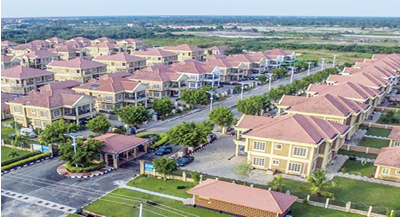Many governors are looking for ways to improve their Internally Generated Revenue (IGR). Amongst them is the Ogun State Governor, Prince Dapo Abiodun, who on November 4, gave what he called an amnesty period for people who built without building permits to get same before December 31. He said the amnesty was to enable home owners to regularise their documentation, having earlier waived the payment of penal fees in demonstration of his mantra of “Building Our Future Together” in the state. He is not alone; for Lagos, Edo, FCT and others, the real estate sector is an avenue to generate huge IGR and should be exploited, experts say. OKWY IROEGBUCHIKEZIE reports.
Amid the cash crunch bedeviling states, many governors are thinking out of the box on how to raise their internally generated revenue. To this end, most of them have beamed their searchlight on real estate. This has made some governors to institute measures to liberalise the process of getting Governor’s Consent, permits, and legalising land and property documents
In Lagos State, for instance, where land is seen as its oil, the Commissioner of Physical Planning and Urban Development has been empowered to approve certain categories of permits to make it easier to acquire titles. The state offers generous discounts to sway people to regularise their papers. It has also made the processes less cumbersome and reduced the time as one could easily get the papers within six months.
For Ogun State, the governor instituted the Property Registration Programme to enable property/ land owners to acquire titles tfor their assets. In a statement made available to The Nation, it enjoined residents to take advantage of the extended period to regularise their illegal developments.
While some states can deploy certain strategies that convince the public to regularise their documents, others seem not to have an idea of what to do despite dwindling fortunes, to the extent that workers in such states are owed salaries running beyond 12 months, and pensioners even more. The only thing the helmsmen of such states do is to wait monthly to collect allocation from Abuja without thinking outside the box.
The scenario is that the federal, state and local governments, the authorities are unable to harness property tax to shore up their Internally Generated Revenues (IGR).
It is evident, however, that while many state governments have failed to adopt reform strategies to enjoy the full potential (fiscal and non-fiscal) of property tax for boosting IGR in the country, others have not taken the idea very seriously.
But some homeowners say there are too many taxes imposed by states on property. The taxes on properties include capital gains tax, land use charge, withholding tax, probate tax, consent tax, stamp duty, registration fee, ratification fees, regularisation fees and development charges.
According to them, the various taxes have made the acquisition of property very expensive, thereby reducing supply of housing and raising sale prices and rents.
Under the federal system, allocation of powers to tax is usually done in such a way that each level of government will have access to at least one broad-based inelastic tax handle for sustainable revenue.
Findings show that the constitutional framework for tenement has hindered some states’ attempt to redesign their property tax, coupled with lack of comprehensive law on property taxation and lack of jurisprudence. However, some experts don’t think so. They hinge it on lack of political will to drive the system.
In 2001, Lagos introduced various forms of property taxation including the Land Use Law, as a result of complaints by the public, real estate operators and professionals. It was later consolidated; part of the consideration for the charge are location of the property, purpose of the property and nature of the property. Retirees also pay certain level of taxes including the neighbourhood improvement charges and tenement rates laws.
The rates are as follows: owner-occupied residential property – 0.0394 per cent; industrial premises of manufacturing concerns – 0.132 per cent, residential property/private school (owner and third party) 0.132 per cent and residential property (without owner in residence) -0.394 per cent.
The Federal Capital Territory (FCT) has keyed into the property tax system. Owners of unoccupied houses now pay taxes. This FCT brand of property taxation has received accolades as operators believe that people who leave their mansions occupied for years no doubt may have used slush funds and should be made to pay.
The need for states to come up with taxes was espoused by Chairman of the Independent Corrupt Practices and other related offences Commission (ICPC), Prof Bolaji Owasanoye, a year ago when he revealed that the anti-graft agency recovered 301 houses from two civil servants in Abuja.
ICPC boss made the disclosure at the inauguration of the House of Representatives Ad-hoc Committee on Investigation of the Operations of Real Estate Developers last year.
He said while 241 buildings were retrieved from one of the suspects at different locations within the FCT, the remaining 60 were recovered on a large expanse of land at another location.
Owasanoye, who did not mention the names of the affected civil servants bemoaned the increasing rate at which corrupt public officers were using real estate investment as a vehicle for hiding ill-gotten wealth and money laundering in the country.
He, however, accused officials of the Federal Capital Development Authority (FCDA) as collaborators in the scam.































